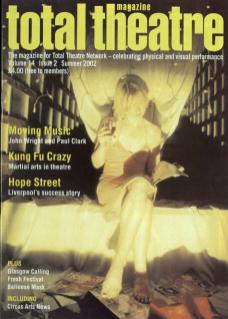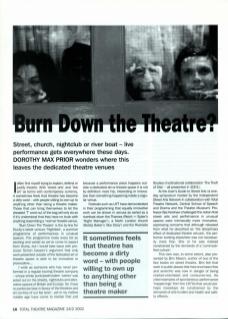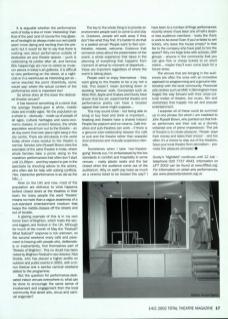I often find myself trying to explain, defend or justify theatre. With 'street arts' and 'live art' as terms with contemporary currency, it sometimes feels that theatre has become a dirty word – with people willing to own up to anything other than being a theatre-maker. Those that can bring themselves to let the dreaded 'T’ word out of the bag will only do so if it's understood that they have no truck with anything resembling a 'normal' theatre venue.
'Burn Down The Theatre' is the by-line for Ducky's latest venture Nightbird, a summer programme of performances in unusual spaces. The programme looks every bit as exciting and varied as we've come to expect from Ducky, but I would take issue with producer Simon Casson's argument that only work presented outside of the dedicated art or theatre space is able to be innovative or provocative...
I write as someone who has never performed in a regular touring theatre company – whose whole punk/postmodern 'career' was acted out on the streets, nightclubs and alternative spaces of Britain and Europe. So I have no particular bias in favour of the theatres and art centres of our fair land – yet in my mellow middle age have come to realise that just because a performance piece happens outside a dedicated art or theatre space it is not by definition more hip, interesting or innovative than something happening inside a regular venue.
Festivals such as LIFT have demonstrated in their programming that equally innovative work can be shown in venues as varied as a riverboat down the Thames (Reich + Syber's Night Manager), a North London church (Bobby Baker's Box Story) and the Riverside Studios (multinational collaboration The Theft of Sita) – all presented in 2001.
At the User's Guide to Street Arts (a one-day symposium hosted by the Independent Street Arts Network in collaboration with Total Theatre Network, Central School of Speech and Drama and the Theatre Museum), Professor Baz Kershaw challenged the notion that street arts and performance in unusual spaces were intrinsically more innovative, expressing concerns that although released from what he described as ‘the disciplinary effect of dedicated theatre venues', the performer working elsewhere was not necessarily more free. She or he was instead ‘constrained by the demands of a commodified culture'.
This view was, to some extent, also presented by Bim Mason, author of one of the few books on street theatre. Bim felt that work in public places that had once been free and anarchic was now in danger of being market-orientated and consumer-led. He cited examples of spontaneous performance ‘happenings’ from the 1970s that would perhaps nowadays be constrained by the demands of arts funders and health and safety officers.
It is arguable whether the performance work of today is less or more interesting than that of the past (and of course the rosy glasses of hindsight do always make our own pasts seem more daring and exciting than the present) but it would be fair to say that there is nothing new about performance outside of dedicated art and theatre spaces – punk is celebrating its jubilee after all, and famous 60s happenings are now re-visited as museum pieces in today's art galleries. It is difficult to view performing on the street, at a nightclub or in a warehouse as interesting per se – we've reached the point (thankfully, some would say) where the actual content of the performance work is important too!
So where does all this leave the dedicated theatre venues?
It has become something of a cliché that the average theatre-goer is white, middle class and middle-aged. Yet the population as a whole is – obviously – made up of people of all ages, cultural heritages and socio-economic classes. In ancient Greece, the whole population would turn out to the theatre – an all-day event that took place right bang in the city centre. There are still places in the world today where mass exodus to the theatre is normal. Scholar John Russell Brown cites the examples of the Jatra Theatre in India, where whole families take a picnic along to the marathon performances that often don't start until 11.00pm – and they expect to join in the spectacle by shouting advice to the actors, who often ask for help with solving conflicts. (Yes, interactive performance is as old as the hills...)
Here (in the UK) and now, most of the population are oblivious to what happens behind closed doors at the theatres in their town: for many people the word 'theatre’ means no more than a vague awareness of a sub-standard entertainment medium that keeps the middle-classes off the streets and out of trouble.
A glaring example of this is in my own home town of Brighton, which hosts the second-biggest arts festival in the UK. Although for much of the month of May the 'Festival? What festival?' response is not unknown, on the second weekend every café and pavement is heaving with people who, deliberately or inadvertently, find themselves part of Streets of Brighton. This no doubt has been noted by Brighton Festival's new director, Nick Dodds, who has placed a higher profile on outdoor and public events in 2002, with a circus festival and a samba carnival weekend added to the programme.
But the question for performance-dedicated indoor venues everywhere is: what can be done to encourage the same sense of involvement and engagement from the local community that street arts, circus and carnival engender?
The key to the whole thing is to provide an environment people want to come to and stay in. Outdoors, people will walk away if they don't like what they find. It's harder to do that in a seated venue! People want to feel comfortable, relaxed, welcome. Evidence that someone cares about the presentation of the event; a whole experience that takes in the planning of everything that happens from moment of arrival to moment of departure... these are important regardless of where the event is taking place.
People want to enjoy themselves – they want going to the theatre to be a joy not a trial. This doesn't mean dumbing down or avoiding 'serious' work. Companies such as Moto Roti, Apple and Snakes and Ducky have shown that live art, experimental theatre and performance poetry can have a broader appeal than some might suppose...
This may sound trivial – but being able to bring or buy food and drink is important... feasting and theatre have a shared history! People like popcorn and ice creams. Café-theatres and pub-theatres can work – if there is a genuine inter-relationship between the café or pub and the theatre rather than separate door entrances and mutually suspicious clientele.
Sometimes when I take 'non-theatregoing’ friends out, I'm embarrassed by the low standards in comfort and hospitality in some venues – nasty plastic seats and the bar closed when the audience come out of the auditorium. Why on earth pay twice as much as a cinema ticket to be treated this way?
I have been to a number of fringe performances recently where I have been one of half a dozen or less audience members – looks like there is work to be done! Even if you've failed to sell tickets, why leave the house empty? Is that fair to the company who have paid to hire the space? Why not forge links with schools, OAP groups – anyone in the community that you can give free or cheap tickets to on short notice... maybe they'll even come back for a future show.
The venues that are bringing in the audiences are often the ones with an innovative approach to programming and a genuine relationship with the local community. Provincial arts centres such as MAC in Birmingham have forged the way forward with their cross-cultural melee of theatre, live music, film and workshops that happily mix art and popular entertainment.
I suppose all of these could be summed up in one phrase (for which I am indebted to John Russell Brown, who pointed out that Indian performers see their role as a divinely ordained one of prime importance): ‘The job of theatre is to create pleasure.' People pays their money and takes their choice and too often it's a choice to stay out of the theatres. Save your local theatre from demolition – promote the pleasure principle!
Ducky's Nightbird continues until 12 July. Information on LIFT 2002 can be found at www.liftfest.org For information on street arts performances, see www.streetartsnetwork.org.uk


